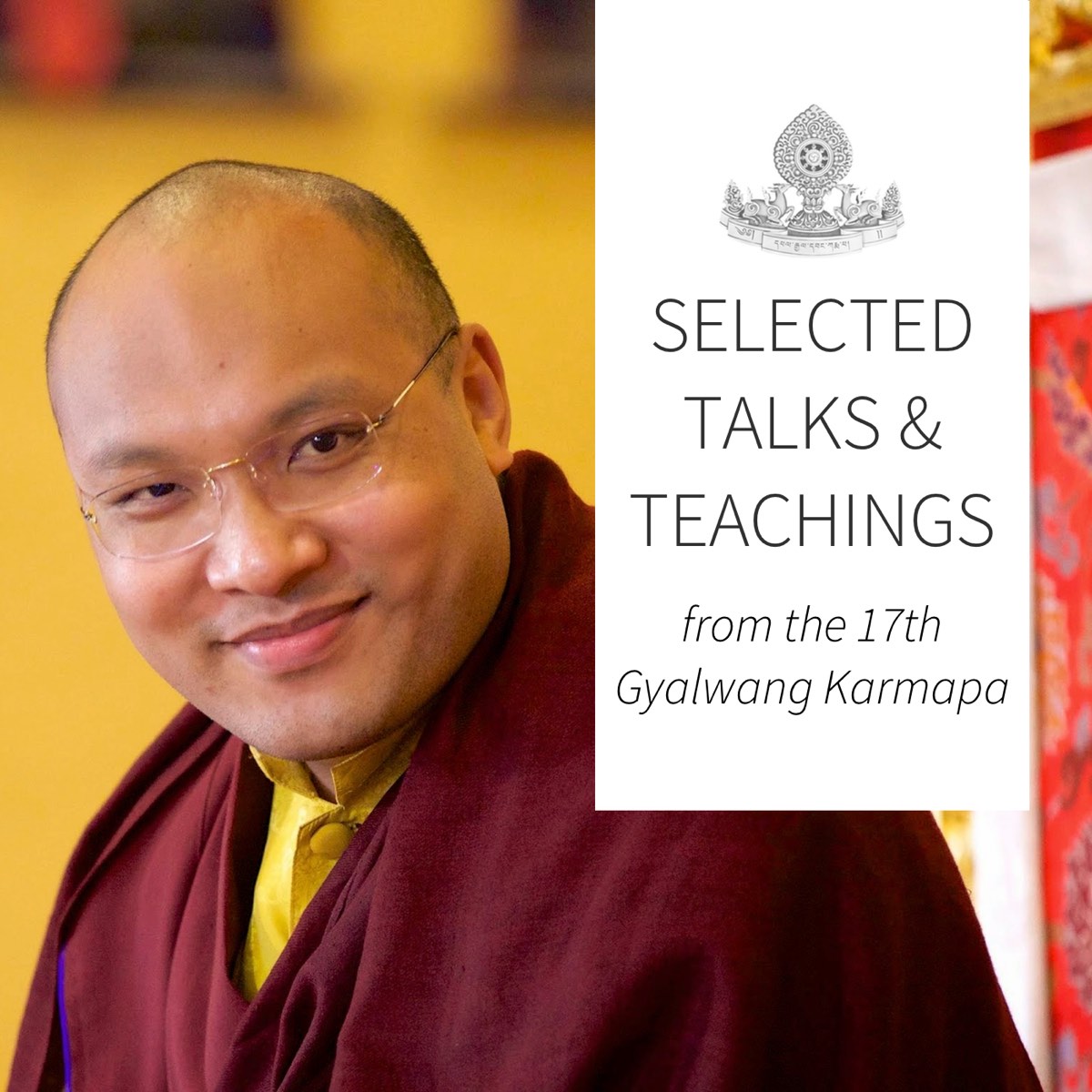
Selected Talks on Buddhism and Meditation by the Karmapa
Selected Talks on Buddhism and Meditation by the Karmapa
The Gyalwang Karmapa is the head of the Karma Kagyu lineage of Tibetan Buddhism and a guide to millions of buddhists around the world. This podcast is dedicated to bringing you selected teachings and talks on buddhist philosophy, meditation, the environment, happiness and much more. Subscribe in iTunes to be notified of new releases.
- 1 hour 48 minutesKarmapa Teaches Mindfulness and Meditation to Young People (Podcast Episode #018)
“We have to remember that we are always changing. Every second we’re changing. We’re changing from moment to moment. As the watch goes ‘tick tock, tick tock’ we are also changing with every second. So what this means is that while we might have a problem in the first moment, in the next moment we have an opportunity to be a new person who doesn’t have that fault. We have the choice that we can actually be a new person in every moment.” – Gyalwang Karmapa
Today’s episode is from a teaching that the Gyalwang Karmapa gave to school students back in 2013 where they asked him questions about meditation, caring for the environment, becoming a happier person, and much more. The Karmapa sat on the floor with the children and his translator, David, and carefully addressed all of the different topics that they raised. Please subscribe to the podcast for future updates, or download the episode directly to your smartphone.
Photo thanks to Olivier Adam.
23 May 2022, 5:15 am - 6 hours 56 minutesHow to Understand the Heart Sutra (Podcast Episode #017)
The Heart Sutra (Sanskrit Prajñāpāramitāhṛdaya or Chinese 心經 Xīnjīng) is one of the most popular and important texts for understanding the Buddha’s view of reality, especially throughout East Asia, Tibet, and now the Western world.
In 2016, the Gyalwang Karmapa traveled to New Delhi and gave an extensive teaching on the Heart Sutra at the request of disciples from around the world. This was the first time that the Karmapa had taught directly on a sutra as opposed to a commentary.
These profound and very detailed teachings auspiciously began on India’s Independence Day and lasted for several days, covering topics such as history, line-by-line explanations, meditations, and even sessions where the Prajñāpāramitā Sutra was written out on paper in a calligraphy style.
 A copy of the Heart Sutra written out by the Gyalwang Karmapa in calligraphy style.
A copy of the Heart Sutra written out by the Gyalwang Karmapa in calligraphy style.
Today’s podcast episode is the complete teachings on the Heart Sutra given by the Karmapa in New Delhi. At almost seven hours long, it is an inspiring and detailed look at how to truly understand this wonderful and essential text outlining the view of the Buddha for those on the Bodhisattva path.
You can download the episode in iTunes or directly using the link below. Please ensure you are subscribed in iTunes to be notified of new episodes and releases.
31 October 2018, 1:28 am - 51 minutes 5 secondsBuddhism and Environmental Protection (Podcast Episode #016)
His Holiness the 17th Karmapa has long spoken of the importance of environmental protection and regularly encourages Buddhist students and others to engage in activities that benefit the natural world.
In today’s podcast we go back to a short and powerful teaching by the Gyalwang Karmapa about the current climate emergency and how he has become involved through promoting a vegetarian diet, the protection of forests, and by encouraging all monasteries and nunneries to partake in various conservation measures.
The Karmapa teaches us how environmental protection accords with the Buddhist principles of compassion, interdependence, and loving-kindness, and how we can use these meditations to strengthen our resolve and reduce human greed and desire.
The episode is in Tibetan with an English translation.
8 January 2018, 6:37 am - 2 hours 6 minutesTransforming Disturbing Emotions (Podcast Episode #015)
This very special episode comes from the Gyalwang Karmapa’s recent trip to Canada where he participated in a dialogue between the three major traditions of the Buddha Dharma – the Theravada, Mahayana, and the Vajrayana.
The topic was on how to transform disturbing emotions, and the discussion involved a ‘question and answer’ format, as well as a short teaching by the Karmapa himself on how meditation and Buddhist philosophy can be used to overcome difficult situations in life.
This episode has English, Chinese and Tibetan translations. You can listen to the podcast episode below or subscribe in iTunes to be notified of future releases.
1 November 2017, 3:31 am - 1 hour 22 minutesHow to Find Freedom Through Meditation (Podcast Episode #014)
Today’s episode comes from the Gyalwang Karmapa’s maiden tour of Canada where he gave teachings all over the country. Many Canadian students had been waiting for years to hear him speak, and so it was a particularly special occasion.
This teaching is on the subject of meditation and how we can use this Buddhist practice to find inner freedom and bring about a more happy and beneficial life. The Karmapa approached the topic from the point of view of his own personal experience, and a wonderful, practical and sometimes humorous occasion unfolded over the course of the hour.
The talk is in Tibetan with an English translation and has been slightly edited for length and audio clarity.
Download this episode // Subscribe in iTunes
26 July 2017, 4:59 am - 2 hours 3 minutesHow to Train Your Mind Throughout the Day (Podcast Episode #013)
Today’s podcast episode is a very special two-part teaching from the Gyalwang Karmapa on the famous text known as the 8 Verses of Mind Training by the the renowned historical master, Geshe Langri Tangpa.
This particular text contains just eight verses on how we can live a meaningful life that is beneficial to both ourselves and others. For example, the Karmapa explains why we should consider other sentient beings as being more important than ourselves:
“Why are sentient beings so valuable? Because in order to achieve awakening we need bodhicitta, and in order to generate bodhicitta we need compassion. And because compassion must be generated with respect to sentient beings, sentient beings are infinitely precious and necessary for our awakening.”
This teaching contains many simple and practical tips for how to live a purposeful life, and how to deal with suffering and hardship in a way that transforms our being without weighing us down.
You can get the podcast here on iTunes or simply download the episode right here. Please make sure you subscribe in iTunes to be notified of new episodes.
14 April 2017, 5:30 am - 1 hour 43 minutesThe Relationship Between Buddhism and Science (Podcast Episode #012)

This week’s podcast episode is a short teaching from the Gyalwang Karmapa on the relationship between Buddhism and science as well as a Q&A session on this and other topics.
The recording took place on the Gyalwang Karmapa’s previous visit to Switzerland where he gave teachings, empowerments and was able to visit many Tibetan communities. In it he discusses the importance of Buddhist and scientific investigation, and how these two different but related fields can benefit our own lives and society in general.
In the Q&A portion of this episode His Holiness covers topics such as Tonglen meditation, how people from different religions can live in harmonious families, and many more.
You can get the podcast here on iTunes or simply download the episode right here. Please make sure you subscribe in iTunes to be notified of new episodes.
Karmapa speaks in Tibetan with an English translator.
30 December 2016, 6:32 am - 2 hours 36 minutesThe Four Noble Truths: How to Turn Suffering into Happiness (Podcast Episode #011)

Today’s podcast episode comes from the Gyalwang Karmapa’s first visit to Paris, France, and is a beautiful teaching on the Four Noble Truths.
This was the very first teaching that the historical Buddha gave and as such it is essential to Buddhists of all traditions, and practitioners of every level. The Karmapa teaches on all of the Noble Truths and discusses how we can overcome different types of suffering.
This episode is two sessions combined into one audio track and thus there is also two question and answer portions where students in the audience ask His Holiness about the refugee crisis in Europe, developing renunciation, and much more.
You can get the podcast here on iTunes or simply download the episode right here. Please make sure you subscribe in iTunes to be notified of new episodes.
Karmapa speaks in Tibetan with and English translator.
13 October 2016, 12:49 am - 1 hour 34 minutesHow to Use Emptiness as a Means to Develop Compassion and Freedom (Podcast Episode #010)

Today we are happy to bring you the tenth episode in the new Podcast series containing selected talks and teachings by His Holiness the 17th Karmapa.
This special teaching took place in the USA and has Tibetan with an English translation.
During this episode, the Gyalwang Karmapa discusses how to meditate on emptiness, and how such meditations can lead to the natural development of compassion. Emptiness opens us up to a new realm of possibility, gratitude, and freedom which can lead to greater compassionate action.
You can get the podcast here on iTunes or simply download the episode right here. Please make sure you subscribe in iTunes to be notified of new episodes.
13 September 2016, 5:36 am - 23 minutes 21 secondsGyalwang Karmapa Teaches on the Seven Line Prayer to Guru Rinpoche (Podcast Episode #009)
Thursday the 14th of July, 2016, is a special day of Padmasambhava – one of the most important masters in history of Tibetan Buddhism. Also known as Guru Rinpoche, he is regularly referred to as ‘the second Buddha’ such is his importance to buddhists around the world.
According to the Tibetan calendar, today is particularly important as it is the Monkey Year – one that only occurs every 12 years and is strongly associated with Guru Rinpoche.
To celebrate this occasion we have created a special two-part podcast episode. First is a recording of the Gyalwang Karmapa chanting the Seven Line Prayer to Guru Rinpoche. After that we bring you a teaching that His Holiness gave on the importance of the Seven Line Prayer and his own particular experience learning and reciting it.
You can get the podcast here on iTunes or simply download the episode right here. Please make sure you subscribe in iTunes to be notified of new episodes.
Tibetan with English Translation. Painting of Guru Rinpoche by the Gyalwang Karmapa.14 July 2016, 4:17 am - 2 hours 38 minutesHow to Use Meditation as a Source of Inner Peace (Podcast Episode #008)

Today’s podcast episode is a special two hour event from the Karmapa’s recent trip to Europe.
In this wonderful teaching, the Gyalwang Karmapa discusses how to use meditation to develop inner peace and contentment in a modern, fast-paced world.
In the second session (which starts at the 1 hour mark), the Karmapa goes on to discuss his own life experience as a child in Tibet and, after being recognized as the Karmapa, how he himself has used meditation in his own daily activities and life events.
The session finishes with a wonderful Question and Answer session where the Karmapa touches on many important topics to do with Buddhist practice and modern life in general.
You can get the podcast here on iTunes or simply download the episode right here. Please make sure you subscribe in iTunes to be notified of new episodes.
Tibetan with English Translation.29 June 2016, 3:04 am - More Episodes? Get the App
Your feedback is valuable to us. Should you encounter any bugs, glitches, lack of functionality or other problems, please email us on [email protected] or join Moon.FM Telegram Group where you can talk directly to the dev team who are happy to answer any queries.

 The Wisdom Podcast
The Wisdom Podcast
 Dawn Mountain Center for Tibetan Buddhism
Dawn Mountain Center for Tibetan Buddhism
 The Wisdom of Compassion: Exploring The Values of Buddhism Through Timeless Meditation Techniques
The Wisdom of Compassion: Exploring The Values of Buddhism Through Timeless Meditation Techniques
 Won Buddhism Dharma Talks
Won Buddhism Dharma Talks
 Intro to Buddhism
Intro to Buddhism
 The Collected Teachings of Ajahn Chah - Audiobook
The Collected Teachings of Ajahn Chah - Audiobook